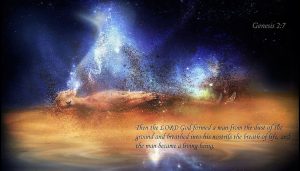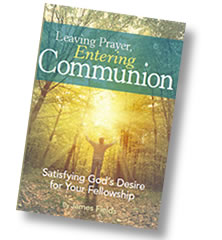
“Jesus called out with a loud voice, ‘Father, into your hands I commit my spirit.’ When he had said this he breathed his last,” Luke 23:46. “Into your hands I commit my spirit”? What’s a human spirit? Why did Jesus’ body die after he surrendered his spirit to Heavenly Father?
Lots of people equate the human soul with the human spirit. They never consider that these two aren’t the same. Consequently, they don’t really know themselves—they’ve never introduced themselves to themselves; they’ve never met their human spirit.
This confusing of soul and spirit deprives us of intimate communion with God’s Spirit. The human soul, the human mind, and the human body cannot interact with God’s Spirit. Jesus plainly declared, “God is spirit and his worshipers must worship in spirit,” John 4:24.
 When God formed the human body it remained lifeless until the Lord “breathed into his nostrils the breath of life,” Genesis 2:7. At that moment God’s Spirit placed a human spirit in the human body. The human spirit completed the human being and the man became a living soul.
When God formed the human body it remained lifeless until the Lord “breathed into his nostrils the breath of life,” Genesis 2:7. At that moment God’s Spirit placed a human spirit in the human body. The human spirit completed the human being and the man became a living soul.
We are three-part creatures: a human spirit housed in a human body which has a soul or mind. Notice how the apostle Paul described us as spirit, soul and body. “May your whole spirit, soul and body be kept blameless at the coming of our Lord Jesus Christ.” 1 Thessalonians 5:23. When someone asked Jesus to choose the most important commandment in the law of Moses, he responded, “Love the Lord your God with all your heart and with all your soul and with all your mind,” Matthew 22:37. Many years before Jesus and Paul lived, Moses referred to the Lord as “the God of the spirits of all mankind,” Numbers 16:22.
As long as the human spirit resides in the body, the body lives. Only the human spirit vitalizes the physical body. James pointed out, “The body without the spirit is dead,” James 2:26. Consequently, when Jesus’ human spirit left his body, his physical person ceased functioning. His body died, but his spirit continued living.
If we want to know what our spirit is like, let’s look at God who is spirit. He created us in his image and likeness; our human spirits mirror him.
God has shape. He is not a formless, universal force. He has hands, eyes, ears and hair. He wears a robe, sits on the throne and rides a chariot. He thinks, feels and speaks. God is a person, not merely an influence, a mist or a fog.
Since God is spirit, he is undetectable to the human senses. Therefore, we depend entirely on the Bible to describe him. Undetectable does not mean unreal.
In fact, everything physical and material is less real than the invisible God. The things we touch, smell, see, hear and taste are in the process of decaying and eventually disappear. On the other hand, spiritual realities remain forever. “For what is seen is temporary, but what is unseen is eternal,” 2 Corinthians 4:18.
Your spirit is real. Like God, the human spirit has shape and form. Your spirit possesses five senses. Therefore, when Jesus’ human spirit stepped out of his mangled, mutilated body, his spirit continued seeing, feeling and thinking. His spirit actively lived while his body laid in the grave. So it is with all of us. When the body ceases living, our spirit goes to be with the Lord until it is reunited with the resurrected body.
 Our relationship with Jesus is spiritual, not soulish or intellectual. The Spirit of the resurrected Jesus does not live in our minds, but resides in our spirits. Relationship with God only takes place when his Spirit moves into our spirits. Jesus referred to the union of God’s Spirit with the human spirit as the new birth. He stated, “Flesh gives birth to flesh, but Spirit gives birth to spirit,” John 3:1-8. The soul, the mind and the body are not born again.
Our relationship with Jesus is spiritual, not soulish or intellectual. The Spirit of the resurrected Jesus does not live in our minds, but resides in our spirits. Relationship with God only takes place when his Spirit moves into our spirits. Jesus referred to the union of God’s Spirit with the human spirit as the new birth. He stated, “Flesh gives birth to flesh, but Spirit gives birth to spirit,” John 3:1-8. The soul, the mind and the body are not born again.
Communion describes an interactive relationship between God’s Spirit and the human spirit which excites us about being with him. Communion is God-centered; prayer requests are self-centered. If we never move beyond making requests of God, we become bored with and disappointed in our private time with him. Prayer becomes routine and uninteresting. Therefore, the pages of this book are designed to help us leave the religious activity most people call prayer as we begin sharing our spirits with the Spirit of God who dwells in us.
Be greatly encouraged!
From the archives of Rev. James Fields
If you would like to learn more you can order his book Leaving Prayer, Entering Communion by clicking here 

